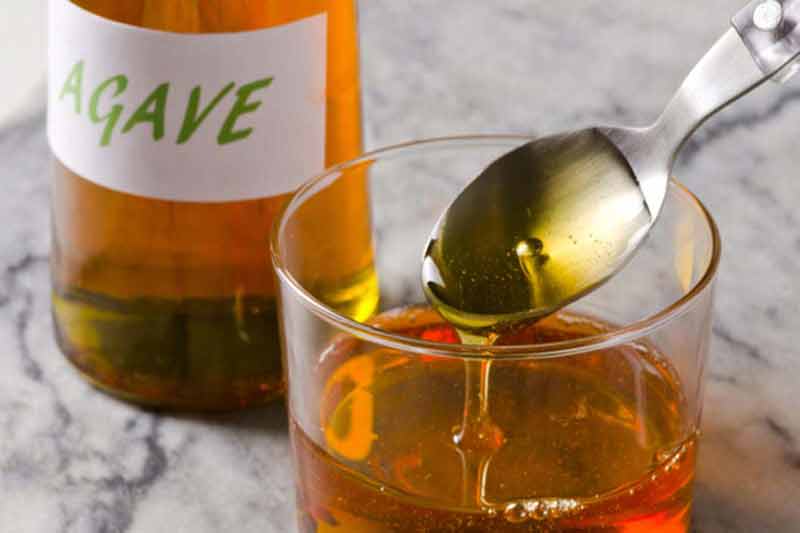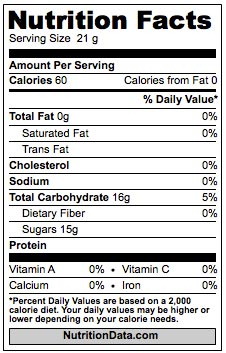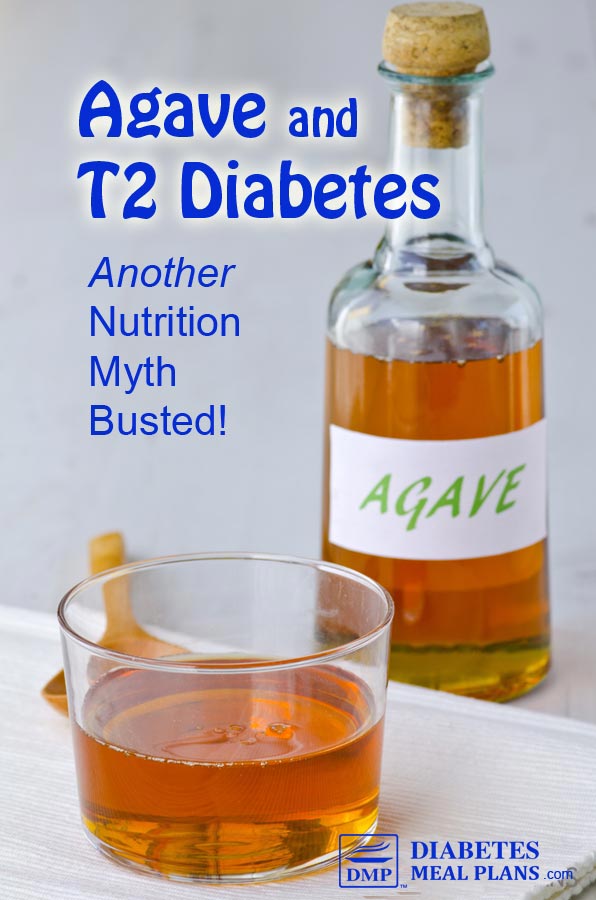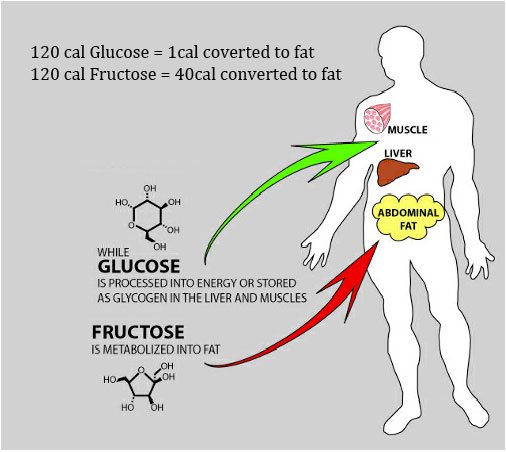Agave is a plant native to regions with hot climates such as Mexico, the Southwestern U.S., and some areas of South America. Like the aloe vera plant, agave is a succulent, which holds a “sap” or “juice” in the center that can be extracted and eaten.
We most often see agave products marketed as “agave nectar” or “agave syrup,” which is similar to honey, only it is sweeter and less viscous than honey.
Twenty years ago, you would never have heard of baked goods being sweetened with agave nectar. But, as the movement for alternative sugars and organic foods has gained momentum, so has the demand for agave nectar.
It has been hailed as a healthier option to regular table sugar or even natural honey, but is it really better for you?
And more importantly, is it a good choice of sweetener if you have type 2 diabetes?

Agave Nutrition Facts
Agave is most often used as a sweetener in baking to replace white or brown sugar. Many recipes will substitute several tablespoons of sugar, to several cups of agave nectar in its place.

One tablespoon of agave nectar contains 60 calories, 16 grams total carbs and 15 grams sugar.
In terms of nutrition, as you can see, agave is mostly straight sugar with little else to offer.
Also, keep in mind that while a serving size may be listed on the label as one or two tablespoons, many recipes will call for more than that. So if a recipe uses a quarter of a cup of agave, then you could potentially be consuming 64 grams of sugar and 240 calories from the syrup alone!
How does agave compare to other sweeteners?
The Glycemic Index (often termed GI) is a numeric indicator of how quickly sugars (glucose) from a food enter into your bloodstream. 100 is very high GI, 55 is considered low. But the lower the GI, the better.
Agave’s claim to fame is that it has a lower glycemic index than other sweeteners do, which is accurate.
Honey has a GI of 61, white table sugar has an GI of 63, and agave nectar has an GI of only 19. The table below compares glycemic index, calories, and the amount of fructose in each of the three sweeteners.
|
|
Agave Nectar |
Honey |
White Sugar |
|
Glycemic Index |
19 |
58 |
58-65 |
|
Calories in 1/4 cup |
240 kcal |
258 kcal |
194 kcal |
|
% Fructose |
75-85% |
50% |
50% |
If you have diabetes, then you probably already know that it is healthier for you to choose foods that have a lower glycemic index, simply because in general, low GI foods will keep your blood sugar more stable.
However, when you make dietary choices, there is a little more to consider than just glycemic index.
For example, agave nectar may have a lower glycemic index than other sweeteners, but it contains a much larger percentage of fructose than other sweeteners do. And fructose and diabetes do not work well together!
Why is Agave High in Fructose?
The reason why agave nectar is so high in fructose is mostly due to the refining process. When a fresh agave plant is cut and the insides are extracted, they are extracting agave “nectar” in its purist form. However, the bottle you pick from a store shelf has been highly refined and has almost zero nutritional value.
During the refining process, the sugary fluid is extracted from the plant and heated to very high temperatures. The extreme heat causes the natural fructans (chains of fructose molecules all stuck together) in the plant to break apart and become single molecules of fructose. This is why there are very high levels of fructose in processed agave nectar.
Another effect of the refining process is that the natural enzymes are destroyed, leaving the syrup void of nutrition. The end product is a highly concentrated syrup that is loaded with fructose.
If you’re curious about why fructose is so bad for diabetics (and you should be), then read on.
Research on Fructose and Diabetes
Overconsumption of fructose has been linked to a whole assortment of health problems – increased weight gain, higher triglyceride levels and cholesterol, high blood pressure and insulin resistance, higher small dense LDL cholesterol, and fatty liver, to name a few.
Studies show that consuming meals heavy in fructose will not leave you feeling as full as eating a meal without fructose does, which is likely part of the problem. Since now loads of processed and packaged foods contain fructose (it’s a cheap substitute for regular sugar!), people are consuming fructose in higher proportions.
The research suggests that eating or drinking a lot of fructose can even make you feel hungrier than before your meal – because it influences a range of hormones – insulin, leptin and ghrelin.
You can see how this could quickly become a cycle – your appetite is not satisfied so you still feel hungry and therefore, eat more food. And the cycle continues.
For this reason, eating a lot of fructose is considered a risk factor for hypertension, insulin resistance, obesity, and cardiovascular disease. And of course, if you already have type 2 diabetes, consuming fructose will make your condition worse and may increase your risk of complications.
Since we know fructose is a sugar, it makes sense that removing it would therefore improve diabetic outcomes, right?
And so it does.
Another study found that diabetics experienced more stable blood sugar when they removed fructose from their diet and replaced it with other carbohydrates.
Just to point out how powerful removing fructose is — a landmark study by Dr Robert Lustig (paediatric endocrinologist who specializes in diabetes treatment), took 43 obese children with at least one chronic metabolic disorder (high blood pressure, cholesterol, insulin resistance or diabetes), and reduced their daily sugar intake from 28% to 10% and their fructose intake from 12% to just 4% of total calories.
The results:
- Fasting blood sugar DOWN 5 points!
- Insulin levels SLASHED by a third
- Blood pressure REDUCED
- Cholesterol REDUCED
- Liver function IMPROVED
And all this happened IN JUST 10 DAYS!!
The moral of the story here is quit sugar and fructose foods like agave, along with all those junky processed foods.
Please pin, tweet or share; then keep on reading. :)

Questions and Answers Regarding Agave
Since we’ve had several questions about agave, I thought it was best to include a short Q&A here, which will hopefully answer your questions too, along with the info already provided above.
Does agave nectar make you gain weight?
Yes. Fructose converts to fat at a much greater rate than pure glucose or other carbohydrate foods. It all has to do with the way the body processes fructose, which is very different to glucose. The metabolism of fructose is left entirely to the liver and directly leads to higher conversion of calories to fat.

Does agave nectar act like sugar?
It can act like sugar as a substitute in recipes. And in the body it partly acts like sugar because sugar is sucrose, which is 50% glucose/ 50% fructose.
Is agave nectar better than honey?
No. Agave is not any better than honey. Overall, they are really the same. For diabetics looking to lower blood sugar and A1C, most types of sugar are a no no, including so called ‘natural ones’ – honey, maple syrup and molasses. Why? Because they are all the same – too high in carbohydrates.
Is agave nectar sugar free?
No. Agave IS a type of sugar. In fact, it is far worse than sugar because the fructose content is so high, which is very problematic for your health (see above).
What are health effects of agave nectar?
Overconsumption of fructose has been linked to increased weight gain, higher triglyceride levels and cholesterol, high blood pressure and insulin resistance, higher small dense LDL cholesterol, and fatty liver, to name a few.
Is agave sweetener a better sweetener than sugar?
No. Because it’s low glycemic index and it’s ‘natural,’ most people think it must be better because it won’t influence blood sugar levels in the same way as pure sugar. While that may be the case, to a certain extent, the carb count is equal to sugar. Plus, for reasons already mentioned, fructose is very problematic to your health.
Is agave nectar a simple carb?
Yes. Fructose is what they call a simple carb.
When you eat simple carbs, they quickly absorb across the small intestine and into your bloodstream, which often results in a higher spike to blood sugar.
With agave, the effect will be lower because it is lower glycemic index, but at the end of the day, the total amount of carbs you consume has the biggest influence on your A1C levels.
Is liquid stevia better than agave?
Yes. Stevia is our preferred choice of sweetener here at Diabetes Meal Plans. It’s what we use to make our deliciously decadent desserts. Stevia has zero carbs and calories and has not been found to have any ill effects on health at all.
The liquid stevia extract is the best option because it is less processed than the fine white powder. It also comes in other flavors like chocolate, caramel, vanilla and coconut, which makes baking more fun (and tasty).
So, is Agave Good for Diabetics?
The answer to this question is a resounding “no!”
Agave is not any healthier for you than white sugar is; that myth is false. So leave that agave nectar on the shelf where it belongs!
It may have a lower glycemic index than sugar and honey, but the high level of fructose it contains is just not worth the trade. That said, you should be careful about your consumption of sugar, honey, and other sweeteners you are using as well.
Research shows that one of the best ways to lower your blood sugar and A1C is to eat a low carb diet. And unfortunately, all forms of sugar really have no place within a low carb diet.
Based on the evidence, the best sweeteners are stevia, monk fruit extract, erythritiol or xylitol – or blends of those.
What’s your sweetener of choice? Leave your comments below.
Please pin, tweet or share this info to help others learn the truth. Thanks!

Ana Clarke
Excellent article, thanks for sharing; I was using honey with my tea in the morning and switched to agave thinking it was better that honey, I was wrong my sugar has spiked tremendously.
Elizabeth
I use Splenda.
Emily - Dietitian (MS, RD)
We’ve written a great article on sugar alternatives here! To summarize, natural sugar alternatives like stevia or monk fruit are preferred, but out of all the other sugar substitutes Splenda does seem to be safer compared to its competitors.
M
Do you recommend Pyure made from organic agave inulin? Thank you.
Emily - Dietitian (MS, RD)
According to the information I found on the website Pyure is made from the stevia plant which means its perfectly acceptable to use as your sweetener of choice!
Cornelius Garbutt
Could you please give me your opinion on Almond mandel milk , containing agave syrup.
Kindest regards Cornelius.
Emily - Dietitian (MS, RD)
I am not familiar with this product, but would guess it’s best left avoided due to the fact it is sweetened with agave. Look for a plain, unsweetened almond milk as that would be a better choice!
Edwin
What about organic agave inulin powder? Example :https://nuts.com/cookingbaking/sweeteners/natural-sugar-replacements/agave-powder.html
Jedha
Can’t provide any thoughts on this at this stage as we have not done research around it. We may endeavor to do so in future – looks interesting.
Debbie
I don’t use sweeteners in my coffee or tea.
I use sugar in baking.
Reading your info helps to understand how things works with diabetes a little better.
Debbie
Jedha
That’s good Debbie because educating yourself about how things work with diabetes is the only way to control it better.
Pat Odoms
I agree that agave is not all that people seem to think it is for good health. I have a girlfriend who insists agave is a healthy option. I will be sending her this article.
Jedha
Yes, lots of people do think it’s healthy Pam. Yet another nutrition myth!
Phiney
I always used maple sugar or agave as a sweetener. But since I was diagnosed with diabetes, I have taken your advice and strictly used the stevia. I really like it, and I even bought the chocolate flavor. You guys are the best, you haven’t steered me wrong yet. THANKS
Jedha
Great to hear Phiney and thanks for the kind words. :)
Renee
Great information, thanks so much! My husband is a diabetic and uses stevia and I use honey & maple syrup but will have to rethink my options! Thanks again
Jedha
Glad you enjoyed it Renee.